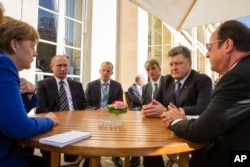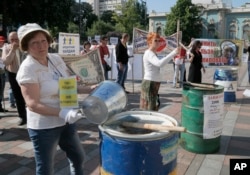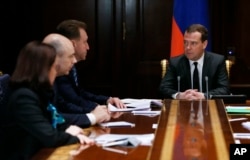Russia plans to sue Ukraine in an English court to recover a multibillion-dollar loan Moscow made to Kyiv in December 2013, just weeks before Ukraine's then-President, Viktor Yanukovych, facing a popular uprising, fled to Russia.
Russian Prime Minister Dmitry Medvedev has ordered officials to prepare a lawsuit against Ukraine for refusing to pay the $3 billion Eurobond debt.
Earlier this month, Ukrainian Prime Minister Arseniy Yatsenyuk announced Ukraine would stop payments on the debt because Russia refused to restructure it. He also canceled $507 million of commercial debt owed by Ukrainian companies to Russian banks.
Failure to pay
The halting of payments amounts to a failure to pay, but there is a 10-day grace period before Ukraine is officially considered in default. Russian officials say they will wait until the new year to start the lawsuit against Ukraine.
Although the two sides could negotiate a deal before going to court, Yevgeny Minchenko, president of Moscow’s International Institute for Political Expertise, says that is unlikely.
“(Ukrainian) President (Petro) Poroshenko does not have a straight majority in the parliament and there are a lot of radicals in Ukrainian politics and (the) Ukrainian parliament as well,” he said. “And, they would not understand and would not appreciate if Poroshenko would decide to give to Russia money back.”
Ukraine’s other creditors and the International Monetary Fund would also have to approve a new deal and any discount.
Back in August, Ukraine negotiated a 20-percent reduction in its debt to foreign creditors.
Russia refused to join Ukraine’s debt restructuring, saying the debt was sovereign, meaning it was owed by a central government. The International Monetary Fund agreed with Russia that the debt was sovereign, a move that at first put pressure on Kyiv to strike a deal with Moscow.
IMF bailout
The IMF, however, then altered its lending rules to allow its $17.5 billion bailout of Ukraine to continue, despite Kyiv's default on its loan from Russia.
Russian President Vladimir Putin said Ukraine could pay back the debt at $1 billion a year if Western governments would act as guarantors, a condition they all rejected. Ukraine said it could not offer Russia better terms than those given to other creditors.
The $3 billion debt deal was negotiated by Putin and Yanukovych in December 2013, when the Ukrainian leader was facing massive street protests after backing out of a trade deal with the European Union in favor of one with Russia. Two months later, Yanukovych fled to Russia, where he later sought asylum.
Just weeks after he fled, Russian special forces took over Ukrainian military bases in Crimea. Then, in March 2014, Moscow annexed the Black Sea peninsula after holding a controversial referendum there.
Russia's military then began supporting separatist rebels fighting government forces in eastern Ukraine.
More than 9,000 people have been killed in fighting in eastern Ukraine, and the country's economy has rapidly declined.
The Ukrainian leaders who succeeded Yanukovych said the loan from Russia amounted to a bribe.
'Clearly politically motivated'
While Russia is trying to portray the debt as a straightforward economic deal, Oleg Buklemishev, a professor of economy at Moscow State University and head of the Center for Economic Policy Research, says the deal was "clearly politically motivated,” with the aim of propping up Yanukovych’s government.
Ukraine, he said, may try to claim that it is “odious debt,” meaning it was incurred for uses that do not benefit the nation and thus should not be enforceable.
Even if Russia wins the court case, economists say it is unlikely to get all the money back and that it could take years for the dispute to be resolved.
"Of course, it will depend on the development of the situation between Russia and Ukraine as a whole,” said Buklemishev.
Trade sanctions
On Monday, Russian Prime Minister announced he had signed a decree imposing trade sanctions on Ukraine in retaliation for Kyiv joining Western sanctions against Russia, and because of the trade deal Kyiv made with the EU after Yanukovych fled.
The EU-Ukraine free trade agreement will go into effect on January 1. That same day, Russia will end its favorable trade status with Ukraine, raising tariffs by 7 percent, and impose a food embargo.
Ukraine estimates the food ban will cause about $600 million in economic losses.
Moscow says it had to end Kyiv's favorable trade status because the EU trade deal will allow European products to slip into Russia through Ukraine while avoiding tariffs.
Russia’s Interfax news agency quoted Deputy Minister of Economic Development Alexey Likhachev as saying Tuesday that Ukraine’s entry into the EU Association Agreement could cause $3.5 billion in damages to Russian companies.
Proponents of Ukraine’s trade deal with the EU say it will open markets for Ukrainian goods and help raise production and safety standards.
The EU, Russia and Ukraine negotiated for a year-and-a-half to try to find a mutually satisfactory deal, but the talks collapsed Monday.








